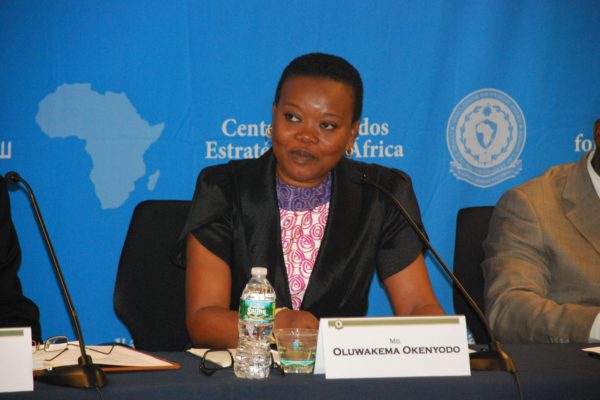 The youth bulge, combined with high levels of unemployment, corruption, inequity, and disaffection with government represent an expanding recruitment pool for a wide range of extremist groups, urban gangs and other destabilizing actors. Yet, if channeled toward productive outlets such as trade schools, entrepreneurship, community leadership and reform campaigns, African youth can be a dynamic force for change. Devising effective means to reach this vital target group must be the focus of security strategies in African for years to come.
The youth bulge, combined with high levels of unemployment, corruption, inequity, and disaffection with government represent an expanding recruitment pool for a wide range of extremist groups, urban gangs and other destabilizing actors. Yet, if channeled toward productive outlets such as trade schools, entrepreneurship, community leadership and reform campaigns, African youth can be a dynamic force for change. Devising effective means to reach this vital target group must be the focus of security strategies in African for years to come.
These were some of the highlights at a recently concluded roundtable on African security hosted by the Africa Center for Strategic Studies at the National Defense University in Washington, D.C. The event was organized in support of the U.S.–Africa Leaders’ Summit with the aim of informing the coverage on peace and security issues and stimulating a discussion on the U.S.–Africa security partnership.
» See also: African experts discuss the continent’s security issues ahead of the U.S. Africa Leaders’ Summit
Ms. Oluwakemi Okenyodo, the Executive Director of the CLEEN Foundation in Nigeria discussed the dynamics of the youth bulge in relation to political violence, extremism and social exclusion in Nigeria.
“The Nigerian youth are nearly seventy five percent of the population, potentially the most innovative and productive and yet the most socially excluded and disgruntled,” Ms. Okenyodo noted. “Nigerian youth, in addition, have extremely high levels of political consciousness and awareness … however, because of the high levels of poverty despite the country’s enormous oil wealth, such awareness becomes a mobilizing tool for violence as has happened in the Niger Delta and other regions in the country,” she cautioned.
Ms. Okenyodo urged Nigerian and U.S. officials to pay close attention to these problems and craft appropriate communications and development strategies to reach out to, and engage this demographic of the population.
“It is this same demographic that the Nigerian military, police and intelligence as well as Boko Haram are recruiting from … the question then becomes … what is our plan for this segment of Nigeria’s population? We need to think about this very seriously,” she urged.
One way forward would be to more closely address the structural weaknesses of the state and in particular to craft institutional and policy reforms to make it more inclusive, less corrupt, more accountable and more effective at delivering public goods such as education, health, economic opportunities, and social safety nets. Such interventions could pay huge dividends by rebuilding the social contract and reestablishing trust between citizens and the public sector. This would require a shift in policy thinking. “Security sector reform programs should be conceived in the context of broader governance issues and not implemented in isolation,” the expert suggested.
Ms. Okenyodo also pointed out some more positive developments taking place in her country.
“Nigeria is currently developing a national security strategy which takes into account the human security dimension and hinges on the fundamental objectives and directive principles of state policy embedded in our constitution,” she told participants. “The strategy identifies some core values that should bring Nigerians together, specifically, discipline, social cohesion and social justice. … To these should be added self-reliance, integrity of creativity and innovation, values which speak to young people and which should therefore be incorporated in the national security strategy.”
She also highlighted the security partnership between the United States and Nigeria.
“Recently at Jaji (The Armed Forces Command and Staff College), members of the United States Joint Special Operations University worked together with their Nigerian counterparts to deliver a highly successful joint professional military education program, ” Ms. Okenyodo explained. “Such partnerships should be welcomed because professionalism in the security sector is one of the prerequisites for democratic civil-military relations.”
The session provoked lively debate.
Niger’s Ambassador to the United States, Dr. Maman S. Sidikou, who has recently appointed as the new African Union (AU) Special Representative for Somalia (SRCC) and Head of the AU Mission in Somalia (AMISOM) emphasized the importance of partnership.
“U.S. policy will be more effective if it is regionally and continentally based,” he suggested. “This means listening much more attentively to the African Union and Regional Economic Communities (RECs) so that U.S. policy can be more closely aligned with African priorities and aspirations.”
Responding to a question about the wider debate on democracy and governance Ms. Okenyodo suggested that the development policies of individual African countries as well as the foreign policies of the United States towards its African partners should reflect the nexus between good governance, democratization and development. “Emphasis should be made on institutionalizing governance within a sound framework for accountability, inclusivity and transparency.”
“Tackling corruption within the political system as a whole plays a vital role in addressing perceptions of exclusion among the youth and indirectly undermining the potency of extremist groups that capitalize on social and political discontent. … This cannot be done if democracy, development and governance are approached separately.
Finally Ms. Okenyodo called for more evidence-based research that could inform policies as well as monitor policy implementation. “This is yet another area for collaboration between African and American partners.”
She closed with the following words of advice: “Our youth are a massive demography that is capable of radically changing the discourse within the country … let us be attentive to them.”
More on: Youth Bulge

